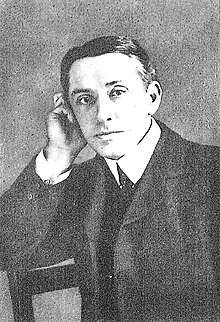J. S. Fletcher
Joseph Smith Fletcher (7 February 1863 – 30 January 1935)[1][2] was an English journalist and author. He wrote more than 230 books on a wide variety of subjects, both fiction and non-fiction, and was one of the most prolific English writers of detective fiction.[2][3]

Early life and education
Fletcher was born in Halifax, West Yorkshire, the son of a clergyman. His father died when he was eight months old, and after which his grandmother raised him on a farm in Darrington, near Pontefract. He was educated at Silcoates School in Wakefield, and after some study of law, he became a journalist.[2][4]
Writing career
At age 20, Fletcher began working in journalism, as a sub-editor in London. He subsequently returned to his native Yorkshire, where he worked first on the Leeds Mercury using the pseudonym A Son of the Soil, and then as a special correspondent for the Yorkshire Post covering Edward VII's coronation in 1902.[2]
Fletcher's first books published were poetry. He then moved on to write numerous works of historical fiction and history, many dealing with Yorkshire, which led to his selection as a fellow of the Royal Historical Society.[2]
Michael Sadleir stated that Fletcher's historical novel, When Charles I Was King (1892), was his best work.[4] Fletcher wrote several novels of rural life in imitation of Richard Jefferies, beginning with The Wonderful Wapentake (1894).[4]
In 1914, Fletcher wrote his first detective novel and went on to write over a hundred more, many featuring the private investigator Ronald Camberwell.[3]
Fletcher is sometimes incorrectly described as a "Golden Age of Detective Fiction" author, but he is in fact an almost exact contemporary of Conan Doyle. Most of his detective fiction works considerably pre-date that era, and even those few published within it do not conform to the closed form and strict rules professed, if not unfailingly observed, by the Golden Age writers.[3]
Personal life
He was married to the Irish writer Rosamond Langbridge, with whom he had one son,[4] Rev. Valentine Fletcher, who has subsequently held various ministries across Yorkshire, including Bradford and Sedbergh.[2]
Death
Fletcher died in Surrey 1935, one week short of his 72nd birthday. He was survived by his wife Rosamond and son Valentine.[2][5]
Works
Novels
- Frank Carisbroke's Stratagem (1888)
- Andrewlina (1889)
- Mr. Spivey's Clerk (1890)
- When Charles the First Was King (1892)
- In the Days of Drake (1895)
- Where Highways Cross (1895)
- Mistress Spitfire (1896)
- Baden Powell of Mafeking (1900)
- Lucian the Dreamer (1903)
- Perris of the Cherry-Trees (1913)
- The King versus Wargrave (1915)
- The Rayner-Slade Amalgamation (1917)
- Paul Campenhaye (1918)
- The Chestermarke Instinct (1918)
- The Borough Treasurer (1919)
- The Middle Temple Murder (1919)
- The Talleyrand Maxim (1919)
- Scarhaven Keep (1920)
- The Herapath Property (1920)
- The Lost Mr. Linthwaite (1920)
- The Orange-Yellow Diamond (1920)
- The Markenmore Mystery (1921)
- The Root of All Evil (1921)
- Wrychester Paradise (1921)
- In the Mayor's Parlour (1922)
- Ravensdene Court (1922)
- The Middle of Things (1922)
- The Charing Cross Mystery (1923)
- The Kang-He Vase (1924)
- The Safety Pin (1924)
- Sea Fog (1925)
- The Bedford Row Mystery (1925)
- The Cartwright Gardens Murder (1925)
- The Mill of Many Windows (1925)
- Dead Men's Money (1928)
- Murder at Wrides Park (1931)
- Murder in Four Degrees (1931)
- Murder of the Ninth Baronet (1932)
- The Borgia Cabinet (1932)
- The Solution of a Mystery (1932)
- Todmanhawe Grange (1937)
Short Stories
- Miscellaneous Stories (1907)
- Mr. Poskitt's Nightcaps (1910)
- The Secret of the Barbican and Other Stories (1924)
Poetry
- The Juvenile Poems of Joseph S. Fletcher (1879)
- Early Poems by Joseph Smith Fletcher (1882)
- Anima Christi (1884)[6]
References
- "J.S. Fletcher Dies; Popular Novelist". The New York Times. 1 February 1935. p. 21.
- Freeman, Sarah (8 May 2006). "How Fame Eluded a Man of Many Words". Yorkshire Post.
- Greene, Hugh (editor) (1973). "Introduction". Further Rivals of Sherlock Holmes. Penguin Books. ISBN 0-14-003891-4.CS1 maint: extra text: authors list (link)
- Sutherland, John (1990). The Stanford Companion to Victorian Fiction. Stanford University Press. p. 228. ISBN 0-8047-1842-3.
- https://www.imdb.com/name/nm0282024/bio bio
- Classics, Delphi. "Collected Works of J. S. Fletcher". Delphi Classics. Retrieved 2 April 2020.
Further reading
Ellis, Roger and Richard Williams, J. S. Fletcher: A Bibliographical Checklist of the British First Editions. Dragonby Press, 2013. ISBN 978-1-871122-21-3
External links

- Works by J. S. Fletcher at Project Gutenberg
- Works by J. S. (Joseph Smith) Fletcher at Faded Page (Canada)
- Works by or about J. S. Fletcher at Internet Archive
- Works by J. S. Fletcher at LibriVox (public domain audiobooks)
